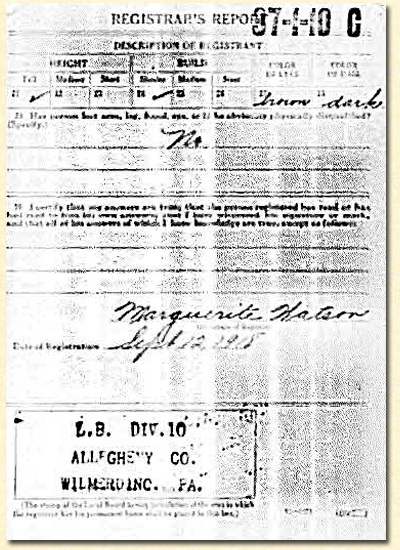At least three times in this show, Matthew Broderick indicates his astonishment of what he has discovered by saying, “I’m gobsmacked.” I had never heard this term of Irish origin, but it is fitting with all that he had discovered.
Matthew’s quest concentrates on two individuals – his grandfather, a World War I soldier and his great-great grandfather who served in the Civil War. I’ll allow you to watch the episode on Hulu (the link is below) without providing the details, as the element of surprise of the twists and turns in his genealogical pursuits are what makes this and the other “Who Do You Think You Are?” episodes so enjoyable.
World War One Research
Unlike Broderick, I haven’t had the opportunity to search for a World War I ancestor, as I have none in my direct ancestry. During World War I, only single men without dependents were drafted. Married men or single men with dependents could enlist; however, they were not compelled by the draft. Since both of my grandfathers were married with dependents, neither was required to serve; however, this is not a dead end for information about this and other young men at the time of this conflict.Compulsory WWI Draft Registration
All men of an eligible age were required to register for the draft. These registration records are invaluable as they provide middle names, dates and location of birth, residence, occupation, dependent information, and descriptive info. Ancestry.com has these records on file, but they are also available via microfilm from the National Archives. As with any record, they are based on the knowledge of the individual at time.
My step-father's father's draft registration (front)
The obverse of the record has my step-father’s father’s information. It lists his middle name, which I had already known from my step-father. His address is consistent with the family home; however, the town is listed as Versailles Township, Allegheny County, Pennsylvania. This entity no longer exists as the township was incorporated as a borough and renamed “White Oak” in 1948. His birth date (January 6, 1882) and citizenship information lists him as native born.
This was what my step-father and apparently his own father also believed concerning his nativity. I remember my step-father telling me that his grandparents came to the US with two of their sons and the youngest, his dad, was born here. Unfortunately, this is incorrect. Newly released Swedish emigration records indicate that Axel was actually born in Sweden and left that country on July 14, 1882 with his mother and two brothers – six months after his birth.
His occupation, a skelp-builder, was with the National Tube Company in McKeesport, PA where he bent strips of metal into pipe which would be welded by another worker. Finally, his second wife’s full-name of Susan Elizabeth Akerberg is used here. She is often only listed by her middle name, Elizabeth (or her nickname of “Lib”), the name by which she was known.

My step-father's father's draft registration (back)
The reverse contains descriptive information regarding Axel Peter Akerberg. He was tall, of slender build, had dark hair, and brown eyes. It also indicated that the registration took place late in the process being September 12, 1918 (World War I ended on November 11, 1918). The registration also occurred at Wilmerding, PA. This I found interesting that a smaller town, Wilmerding that was further from his home than the larger town of McKeesport, was the registration place.
Civil War Research
On “Who Do You Think You Are?,” Matthew Broderick also traced a Civil War ancestor, Robert Martindale. Since I have done a great deal of research in this area, I did a search and discovered that Broderick’s great-great grandmother was awarded a widow’s pension for which she applied within a month following her husband’s death. The pension record may reveal additional information concerning his death in Georgia.One of the things that was not defined very well in this episode is the role of a “skirmisher” that Robert Martindale played. The definition given by the historian was that skirmishers acted as guards. While that is not incorrect, it doesn’t tell the entire story as “skirmishers” were often sent out in advance of the main body of troops and engaged the enemy earlier than the regiment as a whole. Often these men, in their advanced position, were in danger of drawing enemy fire before the main engagement of battle. This allowed the regiment to know the location of the enemy often at the sacrifice of some of the skirmishers.
Despite this, the show was an emotional experience and the discovery of Robert Martindale’s fate also solved a mystery for a Civil War historian and the Veteran’s Administration. This was a great episode and shows how many of us, unbeknown to our current knowledge of our families, may not be aware of these ancestors' service. Before I began my research, our family was only aware of one Civil War ancestor; however, I now know of four: two from my mother’s side and two from my father’s side.
Civil War pensions were granted in the name of all four of these ancestors and these records have greatly added to my knowledge of not only their war time activities, but also their post-war lives and their families. For more info on Civil War pensions, see my series of articles on this subject. In the future, I will address compiled military service records as one of my posts.


No comments:
Post a Comment